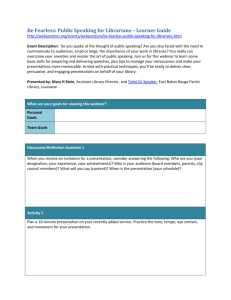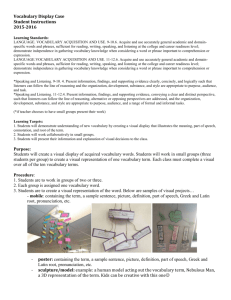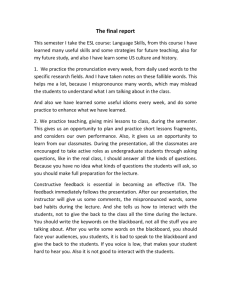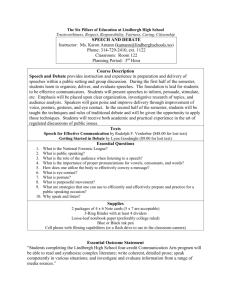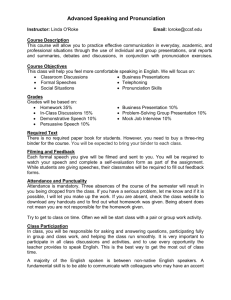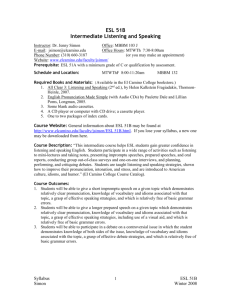File
advertisement
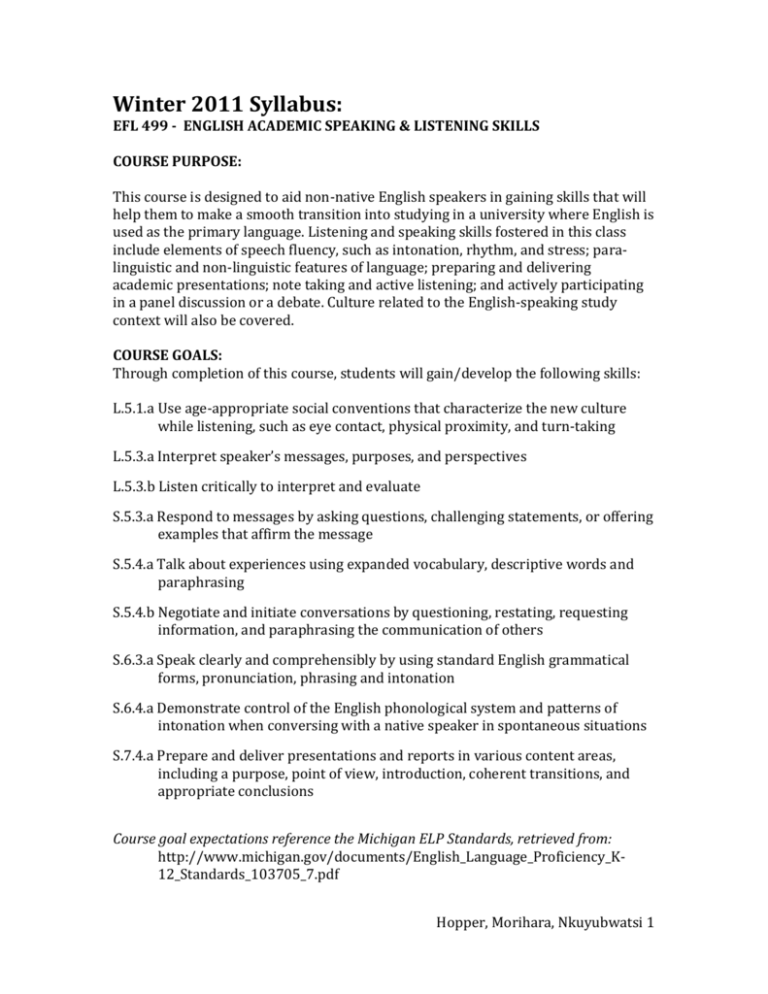
Winter 2011 Syllabus: EFL 499 - ENGLISH ACADEMIC SPEAKING & LISTENING SKILLS COURSE PURPOSE: This course is designed to aid non-native English speakers in gaining skills that will help them to make a smooth transition into studying in a university where English is used as the primary language. Listening and speaking skills fostered in this class include elements of speech fluency, such as intonation, rhythm, and stress; paralinguistic and non-linguistic features of language; preparing and delivering academic presentations; note taking and active listening; and actively participating in a panel discussion or a debate. Culture related to the English-speaking study context will also be covered. COURSE GOALS: Through completion of this course, students will gain/develop the following skills: L.5.1.a Use age-appropriate social conventions that characterize the new culture while listening, such as eye contact, physical proximity, and turn-taking L.5.3.a Interpret speaker’s messages, purposes, and perspectives L.5.3.b Listen critically to interpret and evaluate S.5.3.a Respond to messages by asking questions, challenging statements, or offering examples that affirm the message S.5.4.a Talk about experiences using expanded vocabulary, descriptive words and paraphrasing S.5.4.b Negotiate and initiate conversations by questioning, restating, requesting information, and paraphrasing the communication of others S.6.3.a Speak clearly and comprehensibly by using standard English grammatical forms, pronunciation, phrasing and intonation S.6.4.a Demonstrate control of the English phonological system and patterns of intonation when conversing with a native speaker in spontaneous situations S.7.4.a Prepare and deliver presentations and reports in various content areas, including a purpose, point of view, introduction, coherent transitions, and appropriate conclusions Course goal expectations reference the Michigan ELP Standards, retrieved from: http://www.michigan.gov/documents/English_Language_Proficiency_K12_Standards_103705_7.pdf Hopper, Morihara, Nkuyubwatsi 1 TEXTS AND COURSE MATERIALS: Talk It Over! Listening, Speaking, and Pronunciation, by Joann Rishel Kozyrev Houghton Mifflin, 2002. ISBN: 0-618-14401-3 ($36.95) Assorted handouts adapted from New Ways series & Internet sources CURRICULUM DESIGN BY: Dan Hopper Aya Morihara Bernard Nkuyubwatsi dhopper@emich.edu amorihar@emich.edu bnkuyubw@emich.edu STUDENT EXPECTATIONS: 1. Attend and actively participate in each class 2. Complete speaking & writing tasks as assigned & on time 3. Keep a weekly reflection journal which appropriately discusses the weekly assigned topic (as attached) and/or the YouTube video from that week 4. Assess classmates’ class speaking/listening performance using rubrics, as assigned 5. Participate in group work as assigned, including a controversial-topic panel debate at the end of the class. 6. Access and view YouTube recordings for the purpose of self assessment & reflection GRADING: Impromptu Speaking Assignments Weekly In-Class and Homework Assignments Formal Presentations Midterm Presentation Final Presentation (Panel Debate) Reflection Journal Final Reflection (YouTube Video) 10% 10% 15% 15% 25% 15% 10% The percentage cut-offs for each letter grade are as follows: A 93 C+ 77 A90 C 73 B+ 87 C70 B 83 D 60 B80 E <60 RECOMMENDED RESOURCES: Learn to Listen-Listen to Learn by Roni S. Lebauer Make Your Point!: Debate for ESL/EFL Students by Michael H. Lubetsky http://www.eslflow.com/debateanddiscussionlessons.html http://www.esl-lab.com/ http://www.esl.net/pronunciation_power.html Hopper, Morihara, Nkuyubwatsi 2 TENTATIVE COURSE SCHEDULE Week 1 (Jan 10): Introduction & First Speech Assignment 1-min speeches, YouTube reflection, Create Reflection Journal Week 2 (Jan 17): Pronunciation: Segmentals/Supra-segmentals Impromptu speeches Week 3 (Jan 24): Pronunciation: Segs/Supra-Segs, cont. & Thought Groups Resp to acad content from a video / Impromptu speech Week 4 (Jan 31): Pronunciation: Para-Linguistic & Non-Linguistic Features Phone convos & Mime convos / Formal presentation Week 5 (Feb 7): Speaking: Structure/Rhetoric & Designing speech notes Hooks, body devel., transitions, & concls / Impromptu speech Week 6 (Feb 14): Speaking: Ranking Lists & Defending an Opinion Speeches for spec. purposes, learning to speak to an audience / Week 7 (Feb 21): Speaking: Persuasive/Formal Content areas fm students’ progs of study / Imp. / Prep for MT Week 8 (Feb 28): Pronunciation/Speaking: Mid-term presentations Incl. reflection paper, due the following Monday (Mar 7) Week 9 (Mar 7): Listening: Introduction to Note Taking Basics of note-taking, outlining / Note taking assignment Week 10 (Mar 14): Listening: Main ideas and details/key terms Cause/effect, idea mapping / Week 11 (Mar 21): Listening: Comp/contr, Infer/predict, Timelines/attitudes Formal presentations: Ss each pre a 5-Q quiz to test compr. Week 12 (Mar 28): Discussion: Pros/Cons Impromptu pro/con speeches, beginning Q/A periods Week 13 (Apr 4): Discussion: Asking/answering questions & Debate Impromptu panel/debate topics on everyday social issues Week 14 (Apr 11): Discussion: Debate, cont. & Useful rhet phrases & transitions Prep, research time for Panel Debates/Final presentations Discussion: Final presentations/debates 2-on-2 debates (YouTube reflections & journals due Sat.) Week 15 (Apr 18): Hopper, Morihara, Nkuyubwatsi 3

